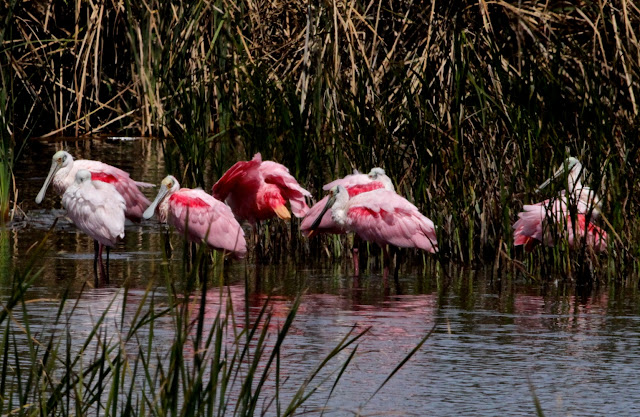This week in birds - #533
A roundup of the week's news of birds and the environment:
A group of Roseate Spoonbills enjoying an afternoon nap.*~*~*~*
According to climate researchers, the last eight years have been the hottest on record. Overall, the world is now 1.2 degrees Celsius (2.1 degrees Fahrenheit) hotter than it was in the second half of the 19th century.
*~*~*~*
And greenhouse gas emissions, the main cause of the Earth heating up, continue to rise.
*~*~*~*
Extreme weather events were the cause of 18 disasters and 474 human deaths in this country last year.
*~*~*~*
This is the beautiful Pine Grosbeak, a bird of the boreal forests that is the American Bird Conservancy's Bird of the Week.
*~*~*~*
The deal that Kevin McCarthy made in order to obtain the speakership of the House of Representatives for himself essentially cedes control of the House Republicans' agenda to the most extreme faction of his party. This does not bode well for action on climate issues for the next two years.
*~*~*~*
A nonprofit group is working to restore the shortgrass prairie of the western states and to allow the buffalo (American bison) to roam there once more.
*~*~*~*
The Biden administration is proposing tougher standards for the emission of soot into the atmosphere from tailpipes, smokestacks, and wildfires. Reducing these emissions could help prevent thousands of premature deaths each year.
*~*~*~*
On a beach in Maryland, a nine-year-old girl has found a treasure: a five-inch tooth of the Otodus megalodon shark species. The species died out approximately 3.5 million years ago.
*~*~*~*
*~*~*~*
The Japanese giant salamander is an endangered species that could become extinct but a male of the species in the Hino River of southwestern Japan is trying to make sure that doesn't happen as he guards hundreds of eggs.
*~*~*~*
Everything in Nature is connected. As populations of insect pollinators decline, yields of fruits and vegetables are reduced, leading to increased disease and death in humans.
*~*~*~*
Scientists are warning that the Great Salt Lake could disappear in as little as five years.
*~*~*~*
Human noise makes it harder for dolphins to communicate and cooperate on tasks which leads them to "shout" under water to make themselves heard by their fellows.
*~*~*~*
Here's a bit of good news: Scientists say that the restoration of the ozone layer, vital for protecting life on Earth, is proceeding on track.




Good morning, Dorothy. Thank you as always for the weekly roundup. As you know this is essential reading in my household. It seems that this week I have been confronted with one environmental catastrophe or another this week, both local and global. It is truly depressing the way we continue to trash this planet. Time for another asteroid strike I think!
ReplyDeleteThere may be one out there somewhere with Earth's name on it.
DeleteI love buffalo and I love to see them roaming free (there's a sizable herd at the North Rim of the Grand Canyon), so the news about a group trying to restore the shortgrass prairie made me smile; however, I am wondering how the government would go about controlling the emission of soot into the air from wildfires?
ReplyDeleteIf the emissions from tailpipes and smokestacks can be controlled, that at least could have a positive impact on the atmosphere/
Delete